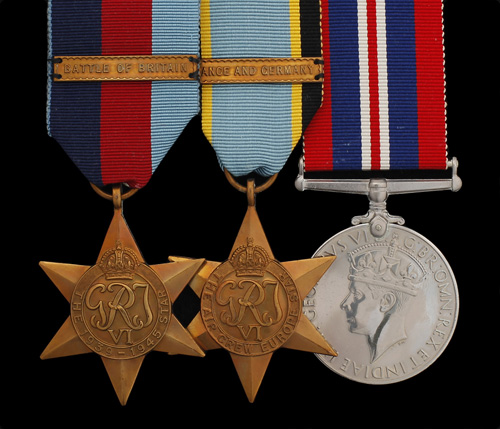
Auction: 1005 - Orders, Decorations, Campaign Medals & Militaria
Lot: 75
A ´Battle of Britain´ Group of Three to Spitfire Pilot Flight Lieutenant R. ´Bob´ Wolton, 152 Squadron Royal Air Force, He Claimed Two Victories During ´The Battle´, and Was Shot Down Himself, 15.8.1940 1939-1945 Star, with Battle of Britain Bar; Air Crew Europe Star, with France and Germany Bar; War Medal, nearly extremely fine, with original Campaign Medal enclosure slip and letter of provenance from recipient addressed to ´Messrs. A.D. Hamilton & Company Limited´, dated 7.1.1981; with a comprehensive file of research (3) Estimate £ 1,000-1,200 Flight Lieutenant Ralph ´Bob´ Wolton born 1914; joined the Royal Air Force as Aircrafthand, July 1932; he undertook initial training at the Torpedo Development Flight, Gosport and at No. 1 Electrical and Wireless School, Cranwell; pre-war postings as a Wireless Operator/Air Gunner included: 58, 142 and 45 Squadrons; he volunteered for pilot training and completed his training at 10 F.T.S.,Tern Hill; his first operational posting as Sergeant Pilot was to ´B´ Flight 152 Squadron (Spitfires), October 1939; moved with the Squadron to Warmwell, 7.7.1940; he shared a Do. 17, 25.7.1940, ´25th July. Squadron Leader Peter Devitt today led the Spitfires of 152 Squadron from Warmwell in their first successful interception. Calling "Tally Ho!" and hearing an "Achtung, Spitfire" response his fighters attacked a Dornier with Junkers Ju 87 "Stuka" dive bombers over Portland. The Dornier crashed near Weymouth, killing one of the crew, and a "Stuka" was seen plunging into the sea. Both kills were claimed by Ralph "Bob" Wolton flying UM-F for Freddie with the coup de grace being delivered to the Dornier by Flying Officer Edward Christopher "Jumbo" Deanesley who then went after a "Stuka" but ended up baling out wounded´; on the 15th August Wolton was shot down, ´15th August. Nine Spitfires of 152 Squadron, from Warmwell Aerodrome, were at 15,000 feet above Portland at 17.15 hours when they heard over the radio: "Many enemy aircraft approaching Portland from the south." Two minutes later a cloud of black specks became visible in mid-channel, at about the same height as the British fighters. There were an estimated one hundred or more enemy aircraft, with Junkers Ju 87s in tight V-formations each comprising three "Stukas" surrounded by Messerschmitt Bf110 escorts. The Spitfires climbed to 18,000 feet in a wide circle that brought them out of the sun to descend through the German ranks about five miles south of Portland Bill. The resulting melee, which was joined by Hurricanes from Exeter, had a mixed outcome. Ralph "Bob" Wolton of 152 Squadron was shot down in the engagement with the "Stukas" and fell out of Spitfire seconds before it crashed into the sea. He managed to swim to one of the offshore marker buoys of the Chesil Beach bombing range, from which he was rescued by a R.A.F. launch from Lyme Regis´ (Ibid); sources are at variance to the exact date (either 7.9.1940 or 11.10.1940) but Wolton was thrown out of his Spitfire when a wing fell off whilst he was attempting a steep dive at 15,000 feet; his parachute was damaged and did not activate until he was 1,000 feet from the ground; he claimed a Ju 88 destroyed on the 26th September; posted to C.F.S., Upavon for an instructor´s course, 16.12.1940; upon completion he was posted as an instructor to 16 F.T.S., Newton to instruct Polish pupils; commissioned Pilot Officer 12.3.1941; posted 51 O.T.U., Cranfield to instruct on night fighters , 8.4.1942; his next operational posting was to 153 Squadron (Beaufighters), Ballyhalbert, 20.1.1943; posted to 96 Squadron (Beaufighters), Honiley, 13.3.1943; attached 417 Squadron (U.S.A.A.F.) to convert its crews to Beaufighters, 18.5.1943-6.8.1943; returned to 96 Squadron and flew with them in night intruder operations until their disbandment, 17.12.1944; he was then posted to 239 Squadron (Mosquitos), West Raynham; retired Flight Lieutenant 4.9.1948; his portrait was done by Cuthbert Orde.
Sold for
£5,200




